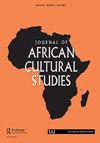Vital Atmospherics: Sonic City-Making in Africa
IF 0.7
2区 社会学
Q2 CULTURAL STUDIES
引用次数: 0
Abstract
ABSTRACT Recent concern for noise in African cities has placed the sonic environment at the center of questions of cityness. This article explores the broadcast of loud music as part of a vital atmospheric which makes the city and sustains everyday life in Gulu, Uganda. I consider everyday Acoli sound concepts wo (noise) and dwan matek (loud sound) with and against concepts of “noise” as it is enacted by environmental regulations concerned with the criminalization of loudness. In so doing, this work brings together sonically rich accounts of African cities and the social density of African sonic worlds with attention to a global South “politics of loudness” and Afrodiasporic sonic geographies. Building from a series of ethnographic encounters, and written in experimental form, this work challenges racialized assumptions embedded in efforts to regulate noise, exploring instead how loud sound generates possibilities for social connection.活力大气:非洲的音速城市建设
ABSTRACT 近期对非洲城市噪音问题的关注将声音环境置于城市问题的中心。本文探讨了在乌干达古卢,喧闹的音乐广播是构成城市和维持日常生活的重要氛围的一部分。我将日常的阿科利声音概念 "wo"(噪音)和 "dwan matek"(响亮的声音)与 "噪音 "的概念结合起来,并将其与 "噪音 "的概念对立起来,因为 "噪音 "是由环境法规制定的,而环境法规则将响亮的声音定为犯罪。在此过程中,这部作品汇集了对非洲城市和非洲声音世界社会密度的丰富声音描述,并关注全球南方的 "响度政治 "和非洲散居地的声音地理学。在一系列人种学接触的基础上,这部作品以实验的形式撰写,挑战了在管制噪音的努力中蕴含的种族假设,探索了响亮的声音如何产生社会联系的可能性。
本文章由计算机程序翻译,如有差异,请以英文原文为准。
求助全文
约1分钟内获得全文
求助全文
来源期刊

Journal of African Cultural Studies
Multiple-
CiteScore
1.70
自引率
10.00%
发文量
13
期刊介绍:
The Journal of African Cultural Studies publishes leading scholarship on African culture from inside and outside Africa, with a special commitment to Africa-based authors and to African languages. Our editorial policy encourages an interdisciplinary approach, involving humanities, including environmental humanities. The journal focuses on dimensions of African culture, performance arts, visual arts, music, cinema, the role of the media, the relationship between culture and power, as well as issues within such fields as popular culture in Africa, sociolinguistic topics of cultural interest, and culture and gender. We welcome in particular articles that show evidence of understanding life on the ground, and that demonstrate local knowledge and linguistic competence. We do not publish articles that offer mostly textual analyses of cultural products like novels and films, nor articles that are mostly historical or those based primarily on secondary (such as digital and library) sources. The journal has evolved from the journal African Languages and Cultures, founded in 1988 in the Department of the Languages and Cultures of Africa at the School of Oriental and African Studies, London. From 2019, it is published in association with the International African Institute, London. Journal of African Cultural Studies publishes original research articles. The journal also publishes an occasional Contemporary Conversations section, in which authors respond to current issues. The section has included reviews, interviews and invited response or position papers. We welcome proposals for future Contemporary Conversations themes.
 求助内容:
求助内容: 应助结果提醒方式:
应助结果提醒方式:


